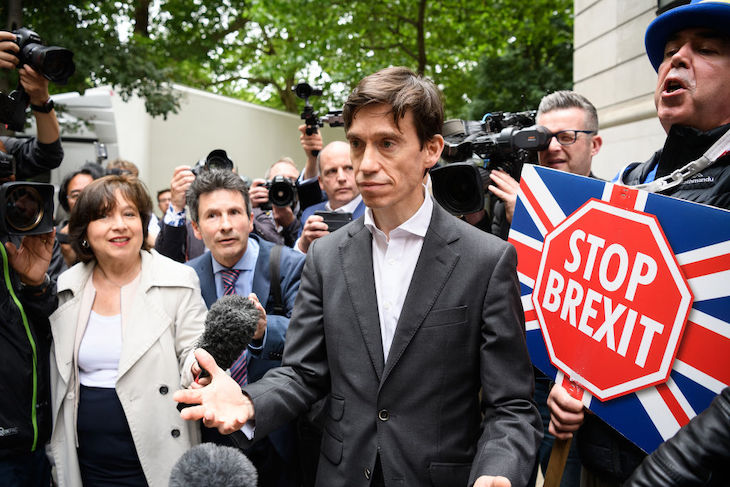‘Rorymania is over,’ Isabel Hardman pops into my inbox to tell me, in last night’s Evening Blend. Rory Stewart’s elimination from the Conservative leadership race cuts short a seductive insurgency that began with pseudo-selfies and flirted with the opportunity, however wishful, of a political realignment. One place Rorymania never took off was inside the Conservative party, where Stewart’s campaign was viewed with something between bewilderment and resentment. At its electoral apex, Rorymania commanded support from just 11.8 per cent of the parliamentary Tory party. Brexit has, of course, distorted priorities within the party and Stewart, in refusing to contemplate a no-deal withdrawal, was effectively the No Brexit candidate, but his rejection is also a rejection of the One Nation Toryism that once defined the party.
The cursed BBC debate crystallised the problem. While the other candidates rowed over who should get tax cuts, Stewart insisted: ‘We do not need more tax cuts. If the money is there, it should be spent on public services.’ The last time the Tory party talked like this was George Osborne’s opposition spiel about ‘sharing the proceeds of growth’ and even that fiscal equivocation didn’t survive into government. It used to be said that part of Margaret Thatcher’s legacy was turning Labour into New Labour, but a more lasting epitaph is that she transformed the Tories into a party of radicals who no longer feel it is their duty to run the establishment but see themselves in permanent revolution against it. Stewart is a throwback to an earlier character of Tory, who believes in the positive, enabling role of government.
Not only is Stewart insufficiently right-wing, he does not see policy baldly in terms of economic incentives and disincentives, the maximising of competition and minimising of regulation. ‘There is a potential for unlocking a Disraeli Young England conservatism,’ Stewart told ConservativeHome last week. That is tellingly paternalistic but it also hints at a restorative Toryism of community, patriotism, civic obligation and social repair. His pledge to make Southend a city is a good example of this kind of thinking. Most Tories would judge the proposal in terms of economic benefits versus buy-in costs, when city status is about municipal pride and a sense of place and self. ‘To be attached to the subdivision,’ Burke teaches, ‘to love the little platoon we belong to in society, is the first principle (the germ as it were) of public affections.’ An organic conservatism of roots and bonds understands this; a dry economic rationalism does not.
Rorymania is over in the Tory leadership contest but does it have a future in the Tory party? Stewart’s style of campaigning — the tieless walkabouts, the spontaneous street conversations — can be recreated, but in substance it belongs to a political philosophy almost vanished from the Conservative party. On its own, this would be merely unfortunate for Stewart and those who think like him. Factions rise and fall in political parties and One Nationism could work its way back, perhaps by offering an alternative conservatism directed at the good life rather than cold economic growth. However, when the sidelining of social Toryism is seen in the context of Brexit, it suggests Thatcher’s radicals are taking a nationalist turn in which economics risks being eclipsed by national identity and even chauvinism. An insular and authoritarian Conservative party cannot be a reforming or reparative one.
Rory Stewart’s opponents have repeatedly charged that he is not a ‘real Conservative’ and, when it takes that capital C, that is probably true. At times his campaign appeared frustrated not merely with the other candidates but with the very party he sought to lead. If he is not a real Conservative, he is an authentic conservative in any meaningful sense of the word. His parliamentary colleagues were asked if he was fit to lead their party and, at most, 37 thought so. Rory Stewart now faces a question of his own: does he and his strain of conservatism still fit in the Conservative Party?







Comments